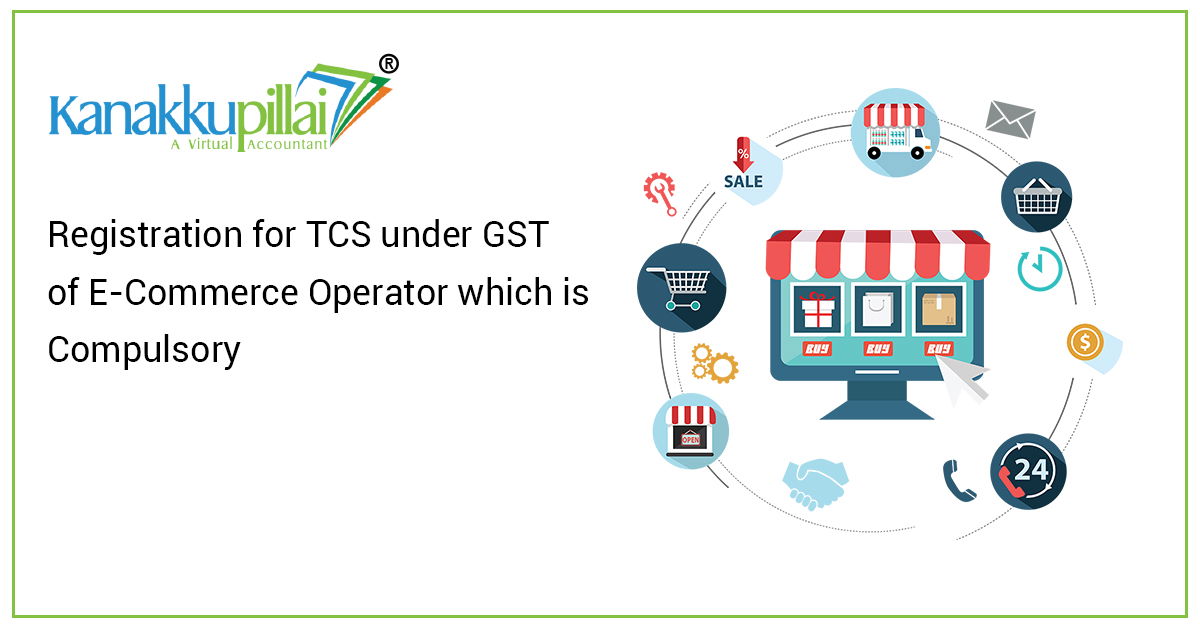TCS or Tax Collected at Source is a tax that is to be collected by certain e-commerce operators on the consideration that is received by them, on the basis of the supply of goods, or services or both by a supplier using the e-commerce operator’s platform. TCS will be charged as a certain percentage of the net taxable supplies made by a supplier.
Liability to collect TCS under GST
TCS is to be collected by the e-commerce operators from the suppliers who are using their e-commerce platform for making the supply of goods or services to the consumers. It shall be collected only if the operators are collecting the consideration from the final consumers on behalf of the suppliers.
So, in short, we can say that when the e-commerce operator pays the consideration on the supply of goods or services to the supplier, they deduct a certain amount from such consideration, which is known as TCS.
But it is to be noted that when an e-commerce platform provides the following services, the TCS need not be deducted from the consideration paid to the vendor or supplier:
– Hotel accommodation or clubs, who are unregistered suppliers
– Transportation of passengers using radio taxi, motor cab or motorcycle
– Housekeeping services like plumbing, carpentry, etc., who are unregistered suppliers
Say Mr. X is a supplier of cosmetics products on the Amazon Platform. Amazon is receiving the payment for the cosmetics from the final consumers for the cosmetics sold. And when Amazon is remitting this amount of consideration received from the final consumer to Mr. X, Amazon should deduct TCS from such payment.
Rate applicable under TCS
The dealers or traders who are distributing goods or services using the e-commerce platform will receive the payment for such supply after deducting a TCS at the rate of 1%. Here, for an intra-state supply, 0.5% of CGST and 0.5% of SGST/UTGST shall be deducted. In case of an inter-state supply, 1% of TCS shall be deducted and paid.
Registration requirements under TCS
- The e-commerce operators who hold the liability to collect TCS should take compulsory registration under GST without any threshold limit being applied for the same.
- Every person who is supplying goods or services using the e-commerce platform is required to take registration under GST, except for the services which are listed under section 9(5) of the CGST Act.
This is because, in the case of these services, e-commerce operators are held liable to pay or meet with GST compliances. So, the suppliers who are making the services listed under section 9(5) of the CGST Act need not take registration under GST unless their turnover is over and above the threshold limit notified by the Act.
iii. An e-commerce operator shall take registration under GST in every state to which it is supplying goods or services.
Due Date for Depositing TCS
TCS shall be deducted from the payments made for a particular month and deposited to the government’s credit within 10 days from the end of that month.
The payment of the tax collected shall be made in the following way:
– IGST and CGST shall be deposited to the credit of the Central Government,
– SGST or UTGST shall be deposited to the credit of the respective State or Union Territory Governments.
Computation of Taxable Value of Supplies for TCS
The TCS shall be collected on the net value of taxable supplies, and this shall be computed as follows:
The total amount or value of taxable supplies of goods and/or services (other than notified services under GST law by all registered persons)
Less: Taxable sales or supplies returned to the distributors through the e-commerce operator
= Net value of Taxable Supplies
Say, Mr. X is a supplier selling cosmetics products on the Amazon Platform. During the month of September 2021, a total sale of INR 25,00,000 was made by him. Out of these supplies worth, INR 2,00,000 were returned by the consumers. So, the net taxable supplies will be INR 23,00,000 (INR 25,00,000 – INR 2,00,000) and the TCS shall be INR 23,000 (INR 23,00,000*1%).
Forms to be used for filing TCS Returns
GSTR-8 is the form to be filed by the e-commerce operators on the 10th of the month which is succeeding the month pertaining to which the payment was made and TCS was deducted or collected.
Say, referring to the example quoted above of Mr. X, the TCS of INR 23,000 deducted shall be deposited to the credit of the government within the 10th of October 2021, which is the month succeeding September 2021.
The details of such TCS deducted shall be available to the suppliers in GSTR – 2A after the due date of filing of TCS. The credit of such TCS deducted from the payment made shall be made available in the electronic cash ledger of the respective suppliers. GSTR 8 cannot be revised once filed, so it should be filed with the utmost care. Any discrepancy found in the data pertaining to the sales and the 2A shall be communicated to the operator and the supplier.
Hence, we can conclude that the e-commerce operators should register under GST for collecting TCS from the suppliers who have made supplies using their platforms, and the credit of the same can be availed by the suppliers for making payment of GST or even claiming the same as a refund.





